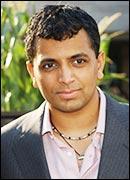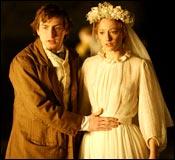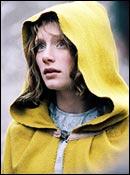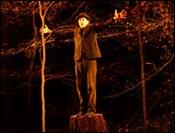 They are suspicious of me
They are suspicious of me
"I interpret it like that. I have been very successful. And I understand that suspicion completely."
M Night Shyamalan
is talking about the mixed reviews that his latest work, The Village, has earned. He received similar reactions for Signs (2002) and Unbreakable (2000). He, of course, shot to international attention with the chiller, The Sixth Sense, that made the world call him the next Alfred Hitchcock.And unlike the emotion he evokes in his movies, Shyamalan is not paranoid. Who knows, he says, "maybe they will be suspicious of me my whole life."
At the moment, Shyamalan is taking a break after promoting The Village 'all around the world.'
His last stop was Japan, where 'they [the media] used every minute. They were wonderful.' He is now coming to terms with what he calls the ups and downs that come with making and releasing a movie.
| |||||||||||
"What was that about?" asks Shyamalan. "Who was it?" A pause. "Oh ya, ya, that lady didn't even make an accusation," he brushes it off.
"You know, I called my attorney and said, 'Are you aware about this?' He said, 'Yes.' I said, 'Is she really accusing me?' He said, 'No-o-o-o, not y-e-t.' And you know, all it is, is the publisher got some publicity on their book."
This situation is true of all his movies, he says.
"Every single one of my movies has had someone accusing me of plagiarism," he says. "For every big movie being made somewhere in the world, somebody's planning something. Harry Potter, whatever -- every single one of them -- but none of them actually make it to a real lawsuit. It gets thrown out the second it comes out. It's a no relation to reality kind of thing."
"If I make up a story right now, there will be some lady somewhere who is gonna be like, I can't believe it, you stole my notes!"
He is not likely to make up a story in a hurry, though.
For the moment, Shyamalan holds forth on making movies he is 'super excited' about:
 My criteria for making a film
My criteria for making a film
And that is probably why Shyamalan may not make Yann Martel's Booker Prize winning novel, Life Of Pi, on film very soon. "You know, I heard about the book from a friend," he says. "I didn't know anything about it. When I started reading it, I was like 'Oh man, it's in Pondicherry.' [Shyamalan was born in Pondicherry] That got my interest, but the first thing that caught my eye was this guy that owns the zoo. It seemed to me a fantasy to make and that idea was very provocative. It wasn't a decision [making it into a movie] I made as I read it. It was very organic, a couple of days later, that it was the right thing to do."
But before that, he admits he wants to make a couple of stories he 'kinda has an idea of.'
The story he was super excited about
In some strange way, The Village reminds me of Walt Disney because he bought 35,000 acres of land in Florida [to set up the amusement park, Disneyland]. It was a huge stretch of swampland and completely isolated. It was cut off from the real world from the inside. I was kind of trying to see that.
I thought, wow. You don't wanna do that for profit. You wanted to do that for entertainment. And that's what I was trying to look at in the way I am most familiar with.
The Village
is not just about crime. It is about microcosms inside of materialism too. We [Americans] are so full of it. We go to work in a fancy car and you realise that the fancy car doesn't mean anything because the neighbour has a fancier car.And it keeps on going forever. Life goes by.
The whys of what you're doing are completely forgotten. It's like you've forgotten the days when you used to walk to work. And you would say hello to Mrs Johnson and you actually knew who Mrs Johnson was. And that meant something to you. And when you came home, it was a good life. You had a purpose -- clean, crisp and clear.
At the end of it all, I imagine myself in this stainless steel room with all these electronic things -- the buttons on your computer screens and all that. And the only thing on the wall in front of you is this sketch of your uncle. And that's the only thing about you that has any originality. Or any emotional grounding.
Everything else costs a zillion dollars.
 Defenders of innocence
Defenders of innocence
I see my movies, especially The Village, as a defender of innocence. And going back to values, more than any racial thing.
I just go with my mind. My son. What would be right by him. And now I have a daughter, so the father-daughter relationship is a very important thing for me now.
I believe in making films my kids will become stronger with. You know, you believe in a set of values that will make them strong.
I love to see people with clarity of personality and values. It seems to me that they are glowing because they are so clear. They become inherently leaders without knowing they are leaders.
I would love my kids to be like that.
Digging into more than the storyboard
I want to dig into different areas of filmmaking more. I want to make something more complex than what's on the storyboard and the cinematography and the costumes.
Everything in The Village is something I have spent more time than I have ever done on any other film.
This movie represents my creative values, without compromising anything -- the costume or the editing, etc.
It is twice as much fun playing with all the aspects of storytelling to convey a very complex story. At the end of the movie, it has very complex colours. And it is not afraid of those colours.
My kind of movie
I guess I like the idea of a movie that steals over you that is revealing later.
It's fun to kind of talk about someone in the first part of the movie -- whether he became something else in the latter part of the movie.
Maybe I will evolve into some other style later. But not without me going too far away from what I am.
I enjoy being a writer. I have a feeling of a good freedom when I write in many genres -- I can make a drama, romance, or a disaster movie -- within this world of mine.
I feel a certain freedom in the way I tell a story. And I do convey a certain language.
Fear IS the unknown
For me, fear IS the unknown. It depends on how you make the unfamiliar threatening.
If it is a bedroom with paintings upside down, that is unfamiliar to you. Why are the paintings upside down?
The woods are not familiar to us. So it is a statement for all human beings: If it is unfamiliar, you should be afraid. If you are not familiar with this person, be afraid. If you are not familiar with the cops on the road, be afraid. You play with this concept in a twisted fashion, and try and evoke the emotional patterns they have.
Like, don't go in that room with the closed door. Now, that room is unknown to you. And it could be just a room. But the way I said it, it's unknown what is in that room.
 Twisted expectations!
Twisted expectations!
I don't really look at my movies with twists. I know everyone else does.
I look at it like a story, at a particular point of which it takes you to another part of the story, which is good for the youngsters as well as elders. I like my movies to have like a Rashomon [Akira Kurosawa's acclaimed movie] effect -- different people discuss the same story in the same moment.
I am trying not to be affected by expectations, to just be myself. If that means 20 films in a row without that twist, that's okay. The idea is to be very natural.
I think that's the only way I survive. I don't want to play the game too much, 'cause then it will be just a game, and not a constructive body of work that's personal and relevant.
So, I am trying not to get affected by everybody fixating on that one work [The Sixth Sense] and not acknowledging the others.
You get frustrated with that because you are trying to make a complex and rich body of work.
But the kind of stigma I am associated with is that even if I did five in a row without it, and the sixth with it, everybody would say, 'Oh, you always have twists!'
You know Signs did not have a twist at all!
I just want to be sincere to what I am doing.
And in ten years, I definitely know The Village will go through people's heads when they think back. I don't think they will say Spider-Man!







